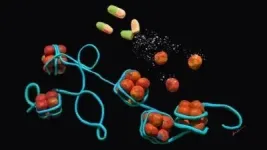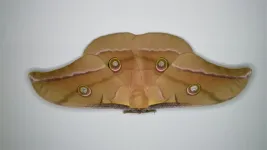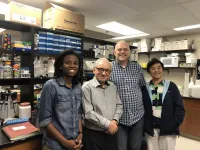INFORMATION:
Lower and safer doses of laughing gas relieve treatment-resistant depression in phase 2 trial
2021-06-09
(Press-News.org) A single one-hour treatment with nitrous oxide - also known as laughing gas - can relieve symptoms of treatment-resistant depression for several weeks, according to a phase 2 clinical trial involving 28 participants. By showing that a 25% concentration of the gas still has therapeutic effects, the results suggest that lower concentrations of nitrous oxide could be useful against depression in the clinic while bringing a lower risk of side effects. Inhaled nitrous oxide is commonly used as a sedative agent in dental and medical offices, but the gas has also attracted attention as a possible treatment for depression. A previous study showed that nitrous oxide had marked antidepressant effects against treatment-resistant major depression, a severe form of depression that often fails to respond to standard antidepressants. However, this earlier study didn't evaluate the treatment's effects beyond 24 hours and used 50% nitrous oxide, a high concentration that can cause side effects such as nausea. Peter Nagele and colleagues investigated the safety and efficacy of a lower concentration of 25% nitrous oxide in 28 patients with treatment-resistant major depression. Over the course of 3 months, the patients received 3 one-hour inhalation sessions with a placebo, 25% nitrous oxide, and 50% nitrous oxide, in series, with each session separated by 4 weeks. After the 25% and 50% sessions, around 85% of the patients showed substantial improvements in their depression symptoms that lasted as long as four weeks. However, the sessions with 25% nitrous oxide also had a four-fold lower risk of adverse effects such as sedation, nausea, and mild dissociation. Although studies with larger patient groups are needed, Nagele et al. note that the responders showed a mean drop in depression scores that was larger than that seen in previous trials of traditional antidepressants.
ELSE PRESS RELEASES FROM THIS DATE:
Curtin study finds aspirin takes the headache out of restoration
2021-06-09
New Curtin research has shown how a readily available, cheap and safe-to-use product found in the medicine cabinet of most homes could be the key to better ecological restoration practices with major benefits for the environment and agriculture.
The study revealed that aspirin, which naturally occurs in the bark of the willow tree and other plants, can improve the survival of grass species important for ecological restoration and sustainable pasture when applied in a seed coating.
Lead researcher Dr Simone Pedrini from the ARC Centre for Mine Site Restoration in Curtin's School of Molecular and Life Sciences, said salicylic acid has been used for its medicinal properties for more than 4000 years and its modern synthetic version, acetylsalicylic acid, or aspirin, is one ...
Rapamycin changes the way our DNA is stored
2021-06-09
Our genetic material is stored in our cells in a specific way to make the meter-long DNA molecule fit into the tiny cell nucleus of each body cell. An international team of researchers at the Max Planck Institute for Biology of Ageing, the CECAD Cluster of Excellence in Ageing research at the University of Cologne, the University College London and the University of Michigan have now been able to show that rapamycin, a well-known anti-ageing candidate, targets gut cells specifically to alter the way of DNA storage inside these cells, and thereby promotes gut health and longevity. This effect has been observed in flies and mice. The researchers believe this finding will open up new possibilities for targeted therapeutic interventions ...
New study underscores the role of race and poverty in COVID-19
2021-06-09
BOSTON - A new analysis by researchers at Massachusetts General Hospital (MGH) offers a novel perspective on the disproportionate impact that COVID-19 has had on people of color, low-income populations, and other structurally disadvantaged groups. Their findings, published in a research letter to the END ...
Study shows new links between high fat diets and colon cancer
2021-06-09
For decades, physicians and dieticians have urged people to limit their intake of high fat foods, citing links to poor health outcomes and some of the leading causes of death in the U.S., such as diabetes, heart disease and cancer.
According to the Centers for Disease Control and Prevention, dietary components high in saturated fats such as red meat are thought to be risk factors for colon cancer. Diet is thought to strongly influence the risk of colorectal cancer, and changes in food habits might reduce up to 70% of this cancer burden.
Other known epidemiological risk factors are family history, inflammatory bowel disease, ...
SARS-CoV-2 detectable -- though likely not transmissible -- on hospital surfaces
2021-06-09
Watching what was happening around the world in early 2020, University of California San Diego School of Medicine researchers knew their region would likely soon be hit with a wave of patients with COVID-19, the infection caused by the coronavirus SARS-CoV-2. They wondered how the virus persists on surfaces, particularly in hospitals, and they knew they had only a small window of time to get started if they wanted to capture a snapshot of the "before" situation -- before patients with the infection were admitted.
After a call late one Sunday night, a team assembled in the ...
Acoustical evolution increases battle between predator, prey
2021-06-09
MELVILLE, N.Y., June 9, 2021 -- In the evolutionary battle between hunter and hunted, sound plays an integral part in the success or failure of the hunt. In the case of bats vs. moths, the insects are using acoustics against their winged foes.
During the 180th Meeting of the Acoustical Society of America, which will be held virtually June 8-10, Thomas Neil, from the University of Bristol, will discuss how moth wings have evolved in composition and structure to help them create anti-bat defenses. The session, "Moth wings are acoustic metamaterials," will take place Wednesday, June 9, at 1 p.m. Eastern U.S.
Nocturnal moths ...
Pandemic quarantine acoustically contributes to mental, physical health degradation
2021-06-09
MELVILLE, N.Y., June 9, 2021 -- The prolonged impact of the COVID-19 pandemic and the interaction restrictions created widespread lockdown fatigue and increased social tension in multiunit housing. But small improvements in quality-of-life routines may help people cope with the health restrictions better than they previously could.
During the 180th Meeting of the Acoustical Society of America, which will be held virtually June 8-10, Braxton Boren, from American University, will discuss noise prevention techniques and the use of alterative acoustic stimulation to help those who find themselves in pandemic-related lockdowns. The session, "The Soundscape of Quarantine," will take place Wednesday, June 9, at 1:45 p.m. Eastern U.S.
While there have been studies about ...
SARS-CoV-2 protease cuts human proteins; possible link to COVID-19 symptoms
2021-06-09
The SARS-CoV-2 papain-like protease (PLpro) plays an essential role in processing viral proteins needed for replication. In addition, the enzyme can cut and inactivate some human proteins important for an immune response. Now, researchers reporting in ACS Infectious Diseases have found other targets of PLpro in the human proteome, including proteins involved in cardiovascular function, blood clotting and inflammation, suggesting a link between the inactivation of these proteins and COVID-19 symptoms.
Viruses like SARS-CoV-2 make multiple proteins as one long "polyprotein." Viral enzymes called proteases recognize specific amino acid sequences in this polyprotein and cut them to release individual proteins. ...
VUMC Team Develops Potential Treatment for Life-threatening Microbial Inflammation
2021-06-09
A cell-penetrating peptide developed by researchers at Vanderbilt University Medical Center can prevent, in an animal model, the often-fatal septic shock that can result from bacterial and viral infections.
Their findings, published this week in Scientific Reports, could lead to a way to protect patients at highest risk for severe complications and death from out-of-control inflammatory responses to microbial infections, including COVID-19.
"Life-threatening microbial inflammation hits harder (in) patients with metabolic syndrome, a condition afflicting millions of people in the United States and worldwide," said the paper's corresponding author, Jacek Hawiger, MD, PhD, the Louise B. McGavock Chair in Medicine and Distinguished Professor of Medicine ...
CHIME telescope detects more than 500 mysterious fast radio bursts in its first year of operation
2021-06-09
BRIEFING NOTE: Researchers will announce these results at the 238th AAS meeting on Wednesday, June 9 at 12:15 p.m. E.D.T. Press registration details can be found here: https://aas.org/meetings/aas238/press. Interested journalists can also tune in to AAS briefings streamed live at: https://www.youtube.com/c/AASPressOffice. Please note that you will not be able to ask questions via YouTube; to ask questions, you'll need to register for the meeting and join the briefings via Zoom. Recordings will be archived on the AAS Press Office YouTube channel afterward.
To catch sight of a fast radio burst is to be extremely lucky in where and when you point your radio dish. Fast radio bursts, or FRBs, are oddly bright flashes of light, registering ...



